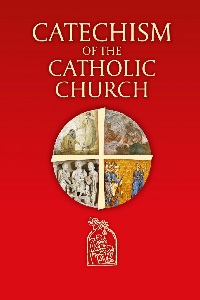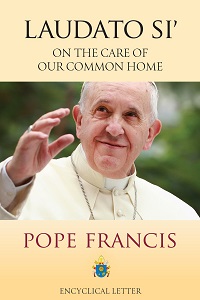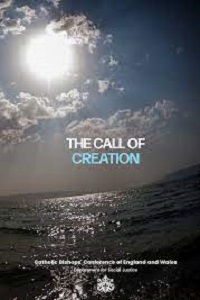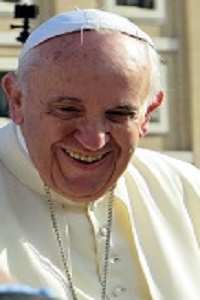How will these resources help you?
In RE, we often teach that Christians care for the environment because God created the world, as taught in Genesis 1. However, as you would expect, there is much more to Catholic teaching on the matter beyond these words of scripture. It can be really useful to teach beyond the short quotes of ‘till and keep the land’ to allow students the opportunity to gain a fuller understanding of the faith and how it is lived by Catholics today. Catholics have three sources of authority that guide their conscience: Scripture, Tradition and Magisterium. Referring to more than just scripture will allow teachers to present Catholicism more accurately.
Official Catholic teaching about the world as God’s creation

Catechism of the Catholic Church: The CTS Definitive and Complete Edition
published by The Catholic Truth Society, (2022), 9781784691066
The Catechism is a great resource for looking up official Catholic teachings to use in lessons to support any topics being studied. It is written by the Magisterium (official teaching authority of the Church) and is therefore an important source of authority, trusted by Catholics to inform their conscience on belief, practice and morality. There is also a YouCat publication which is written especially for young people.
The Catholic worldview is that there is more to our reality than its physical nature and this is because Jesus, the Son of God, has walked the earth and infused it with his holiness. A useful analogy in the classroom could be a teabag in hot water: the tea and the water cannot be separated even after the tea bag is removed. In the same way, God’s love is in the natural world and cannot be removed. This is known in theology as the sacramental nature of reality. Sacraments as rituals are described by the Catechism as ‘signs of grace instituted by Christ’ (CCC 1131). Sacraments use signs and symbols to signal to Catholics something invisible – God’s grace – is being received in those moments. In the same way, the natural world is also a sacrament – a sign pointing us towards God. This understanding can help students to delve more deeply into the Catholic respect for all of creation because it is not just that Genesis tells us that it is God’s creation, and a one-off event, but that all of creation is a sign revealing God’s love to us. This can give greater context to the beliefs informing the environmental practices of Catholics today.
What does the Catholic Church teach about caring for the environment today?

Laudato Si’
published by Vatican Press, (2015), 9781784690700
In Catholic tradition, popes might write encyclicals (letters) to address concerns of the day. Pope Francis addressed his encyclical Laudato Si’ to the whole world, urgently appealing ‘for a new dialogue about how we are shaping the future of our planet, drawing attention to issues such as the loss of biodiversity, increasing pollution and 'throw-away culture', depletion of resources and global inequality. His letter was building on the letters of Popes before him who have also urged the world to take notice of this as a social issue. He wrote, ‘We need a conversation which includes everyone, since the environmental challenge we are undergoing, and its human roots, concern and affect us all’ (LS14). Not long after the publication of Laudato Si’, Pope Francis was invited to address the UN General Assembly, therefore showing how his insight was valued by the world. He has continued to be a part of the world-wide debate on the ecological crisis. This could be a great scholarly resource to prompt discussion in the classroom. After looking at the Christian story of creation, students could discuss questions such as: 'Should the Catholic church have a say in the climate emergency?’ or ‘Should the church be more focused on teaching about God rather than social issues?’ where they put the Pope’s teachings to the test.
How did Catholics in the UK respond to Laudato Si’?

The Call of Creation
published by the Catholic Bishops' Conference of England and Wales, (2022)
In 2022, the Social Justice Department of the Catholic Bishops’ Conference of England and Wales launched a new edition of its teaching document on the environment, ‘The Call of Creation’. In this document, they say ‘at the parish, diocesan, and national level, the Church must, and will, play its part. This involves taking action to reduce carbon emissions as well as protecting and promoting biodiversity. We must also take action within our Catholic schools, colleges, and universities, encouraging actions even in simple ways. We must develop our long-term strategic planning to reduce our carbon footprint substantially and, in other respects, contribute to the care of the natural environment’. This document calls for this action because the situation at present ‘is contrary to the vision of the Gospel’. In the classroom, this could be used to encourage students to delve into the message of the Gospel in the context of environmental action. Students could look at how the reality of the climate crisis is that the poor are worse affected. Jesus never said to recycle, but he did give us the Beatitudes, in which we learn that He wants us to stand in solidarity with anybody being treated unjustly.
Do Catholics today really care about climate change?

The pope is concerned about climate change. How do US Catholics feel about it?
by Jeff Diamant, published by Pew Research Center, (2023)
In RE, not only do we teach a religion’s beliefs but also how the religion is practised. It is therefore interesting to consider sociological data on topics to see how the religion is lived in today’s world, especially as it helps students to understand lived religion as complex and diverse. This article says that ‘US Catholics indicate that climate change is not discussed frequently from the pulpit’ and ‘Catholics are no more likely than Americans overall to view climate change as a serious problem’ and ‘an identical share in each group say global climate change is either an extremely or very serious problem (57%)’. A great stimulus to help students consider questions, such as: ‘Does it matter that climate change is not discussed in Catholic churches?’ and ‘Why might the US Catholic worldview not be in line with the Magisterium teachings of the Catholic Church?’.
Further materials
Guardians of Creation Project, published by St Marys' University
Visit this website
CAFOD LiveSimply Award, published by CAFOD
Visit this website
Bishop John Arnold spearheads Catholic efforts to go carbon neutral by the Catholic Bishops' Conference of England and Wales, (2021)
Read this article
Jennifer Knight is Head of RE in a Catholic school where she teaches AQA Syllabus B and has previously taught AQA Syllabus A in non-faith schools.
Text © Jennifer Knight, 2023.
Text © Jennifer Knight, 2023.



